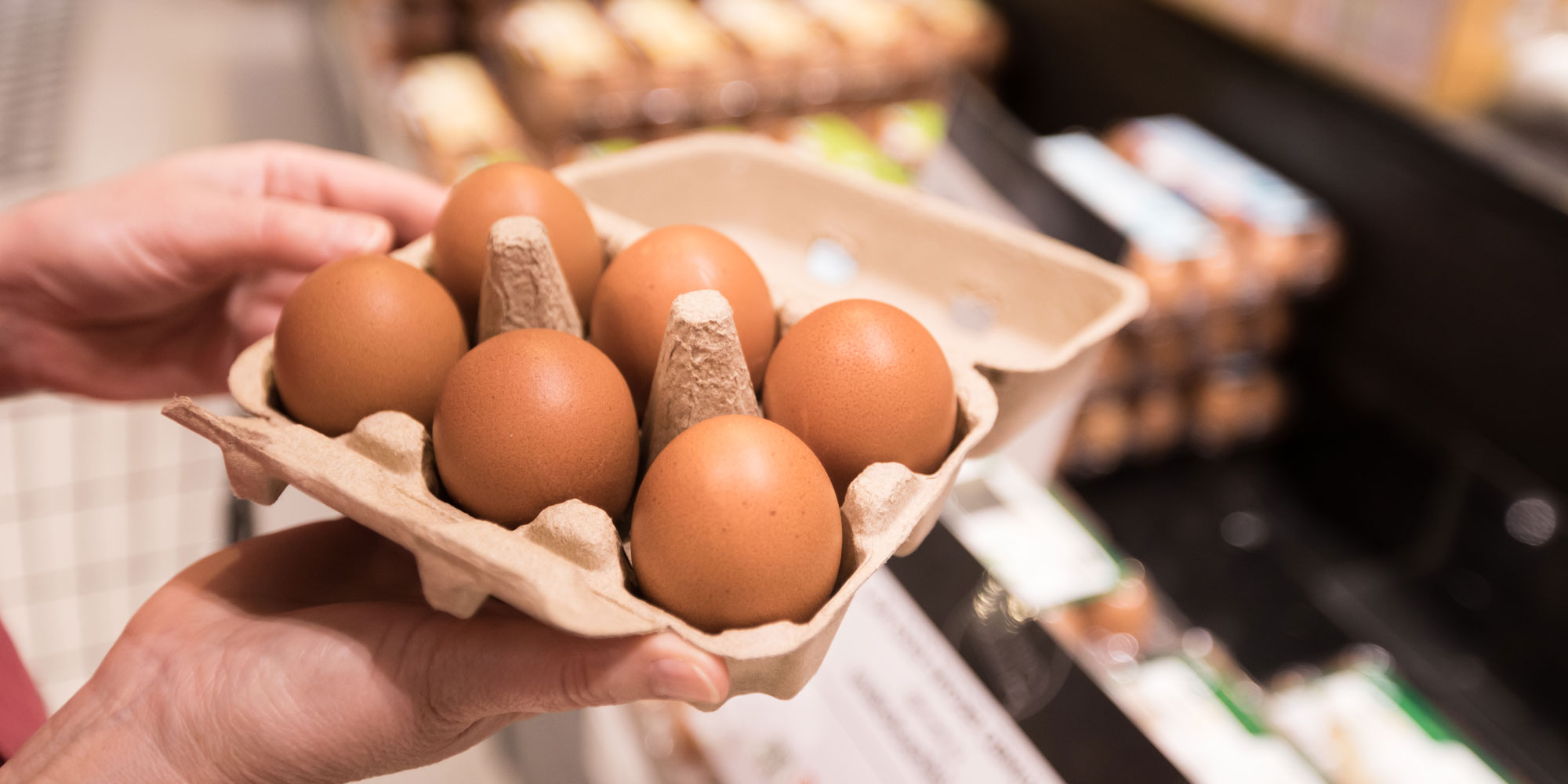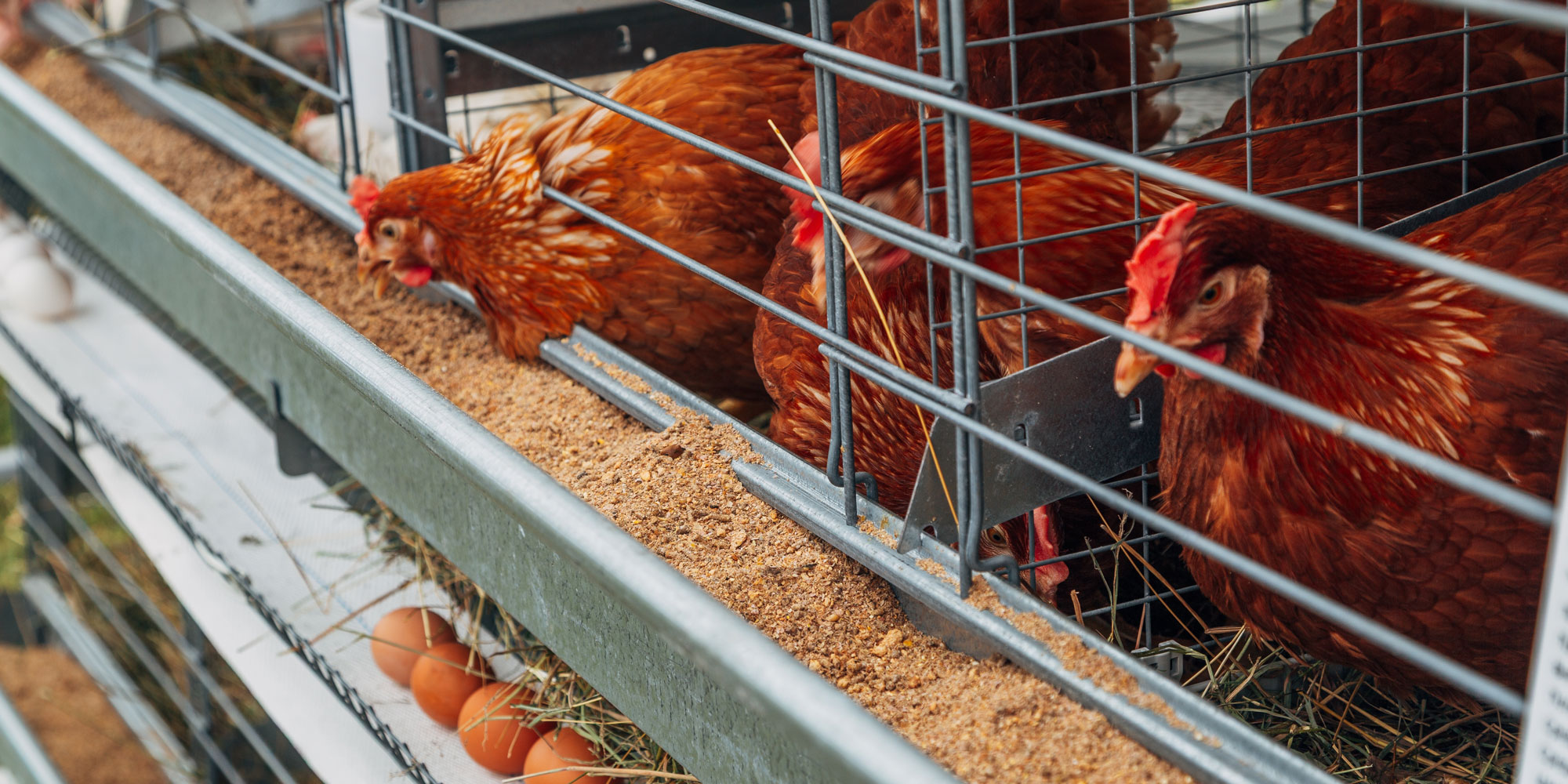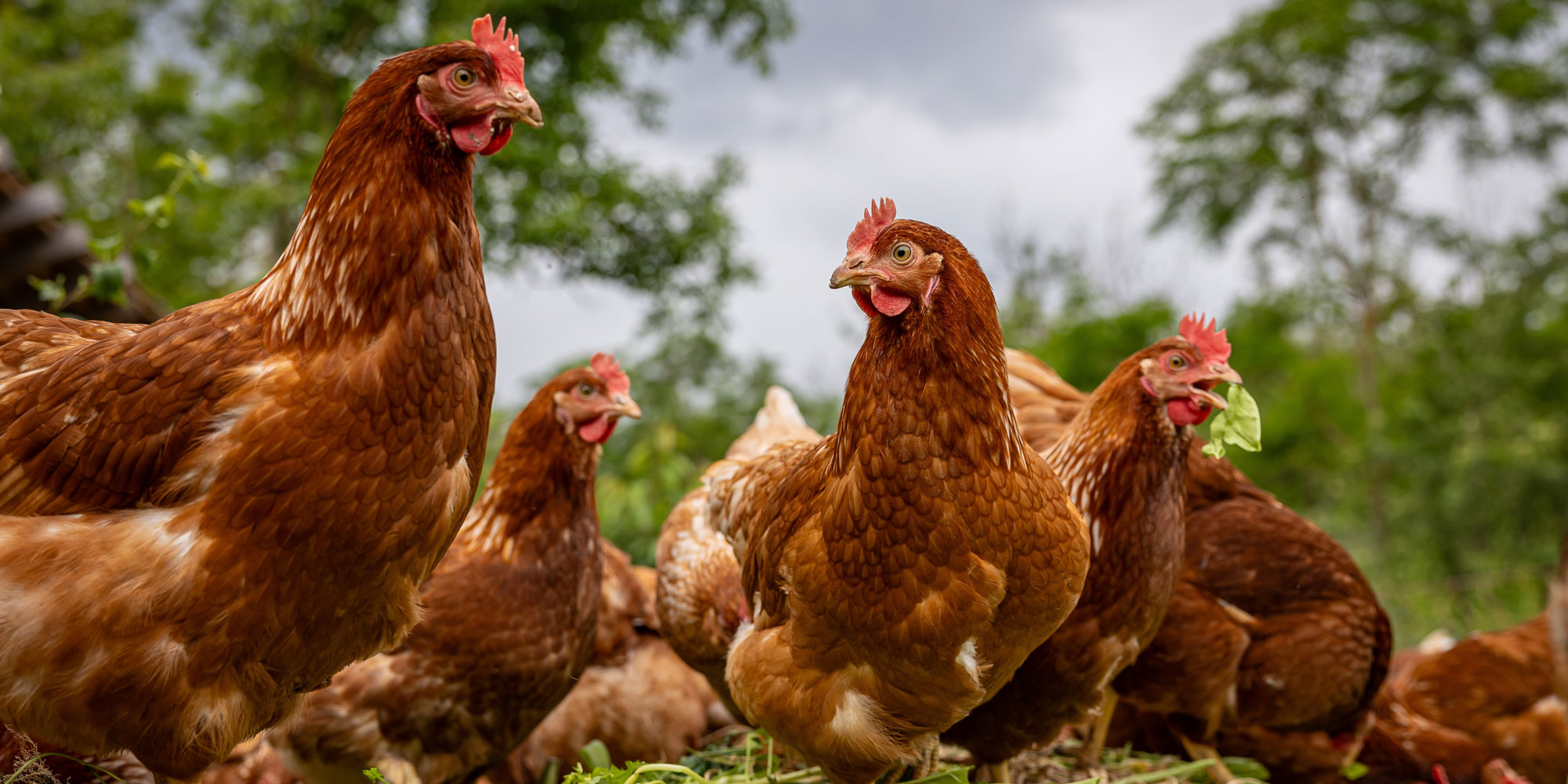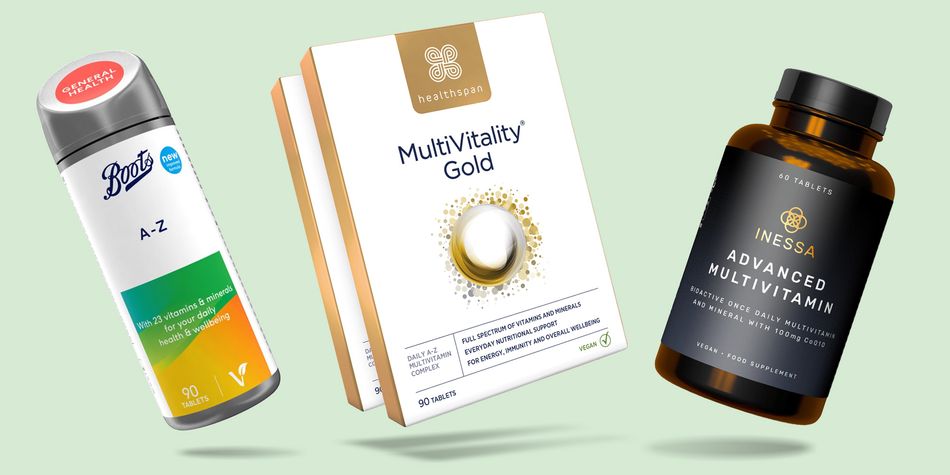Retailers are still stocking eggs from caged hens

Conventional battery cages for laying hens were banned in the UK and EU in 2012. But 'enriched' cages are still allowed, despite many animal welfare charities campaigning for them to be banned.
Compassion in World Farming (CiWF) and the Humane League want to end all cage confinement for hens, and many retailers have already made a commitment to go cage-free by December 2025. But not all supermarkets have made the switch.
Earlier this year, it was announced that Farmfoods had decided to drop its commitment to go cage-free, stating that it was 'unable to secure supply of sufficient volume of non-cage eggs to meet consumer demand at an acceptable cost to ensure choice for all consumers'.
It's now the only UK supermarket chain without a cage-free commitment – although Heron Foods and Iceland have pushed back on the commitment deadline of 2025. And in Heron Foods' case, the commitment only applies to eggs sold whole (shell eggs) and not foods that contain egg (ingredient eggs).
Most UK supermarkets set themselves a deadline of the end of 2025 to go cage-free. See our table below for retailers' commitment timelines.
The cage-free commitment
All major UK supermarkets entered into a voluntary commitment to stop selling eggs that come from hens kept in cages by the end of 2025.
Some have sold eggs laid by cage-free hens for many years. M&S, for example, has been cage-free for both shell eggs and eggs used as ingredients in its prepared food since 2002. Waitrose has been the same since 2008, Sainsbury's since 2009 and Co-op since 2010.
CiWF, which produces an annual EggTrack report, says: ‘The progress made year on year shows most major retailers are on track to meet their 2025 cage-free commitment.’
Only Farmfoods doesn't have a current commitment. And, as we mentioned, Heron Foods and Iceland have later target dates to reach a cage-free supply chain. Heron Foods only refers to shell eggs in its statement on its website.
The table below shows estimated data. Not all figures have been confirmed by supermarkets, and some may be out of date due to differences in company reporting.
| Retailer | Cage-free commitment pledge? | Shell eggs cage-free | Cage-free egg ingredients |
| Aldi | Yes – end of 2025 | 100% | 72% (retailer confirmed) |
| Asda | Yes – end of 2025 | 73% (latest figures) | Unknown |
| Co-op | Yes – already reached | 100% | 100% |
| Farmfoods | No commitment | Unknown | Unknown |
| Heron Foods | Yes – July 2026, but shell only | Unknown | Unknown |
| Iceland | Yes – June 2027 | 29% (latest figures) | 68% (retailer confirmed) |
| Lidl | Yes – end of 2025 | 74% (latest figures) | 73% (latest figures) |
| M&S | Yes – already reached | 100% | 100% |
| Morrisons | Yes – end of 2025, already 100% for shell eggs | 100% | 60% (retailer confirmed) |
| Sainsbury's | Yes – already reached | 100% | 100% |
| Spar UK | Yes – end of 2025 | Unknown | Unknown |
| Tesco | Yes – end of 2025 | 68% | 86% (latest figures) |
| Waitrose | Yes – already reached | 100% | 100% |

What are enriched cages?
Battery cages, which still exist in some parts of the world, house chickens individually, with no space for the birds to move around or exhibit natural behaviours. With enriched cages, which hold about 90 hens, each hen gets around 600sq cm of usable space (similar to an A4 piece of paper). They have somewhere for the hens to perch, as well as a tiny scratch mat and nest box.
But enriched cages are still very restrictive in terms of space and allowing birds to exhibit natural behaviour. Hens are usually housed in closed sheds with rows of cages stacked on top of each other. Lighting is low to prevent the hens behaving aggressively, and there's no natural light.
In Europe, Austria, Luxembourg and Switzerland are completely cage-free, while France has banned the installation of any new cage systems. Germany aims to be cage-free by 2026, and the Czech Republic by 2027.
In the UK, 82% of UK eggs are from cage-free systems, but that leaves 18% provided by 8m caged hens each year. This number is expected to drop to approximately 4m in a year or so as a result of the 2025 cage-free commitment.
According to a recent poll carried out by CiWF, more than two-thirds (67%) of the British public are willing to pay more for eggs produced from hens not kept in cages – 75% think the use of cages in farming is cruel.
Sean Gifford, managing director at the Humane League UK, says, 'As long as these companies continue sourcing eggs from caged hens, whether for shell eggs or ingredients, the public is at risk of purchasing products which are at odds with their own values.'
Campaigners are calling on the Department for Environment, Food and Rural Affairs (Defra) to ban caged systems.
Dan McAlpine, food business manager at CiWF, says that legislation is now needed to get rid of the remaining cages. 'While voluntary cage-free commitments across the industry have been a welcome step forward, they’re not enough.
'We now need legislative action to safeguard UK farmers who have already invested in cage-free systems. Without it, they risk being undercut by lower-welfare systems still operating in the UK and by cheaper imports of eggs from caged hens.'
How can you check if your eggs come from caged hens?
The majority of eggs in the UK are produced under the British Lion scheme. Although this is primarily a food safety scheme, eggs must be stamped with their farming method.
A code that is a mixture of letters and numbers can be found on each egg, along with the best before date.
The first digit tells you how the egg was farmed – the systems are as follows:
- 0 = Organic egg
- 1 = Free-range egg
- 2 = Barn egg
- 3 = Cage egg
This obviously only applies to shell eggs – the supply chains associated with eggs used as an ingredient are far more complex.

How do you find out if prepared food contains eggs from caged hens?
It's very difficult to tell whether the eggs used as an ingredient in a prepared product are cage-free.
If you're buying a supermarket omelette, quiche, mayonnaise or anything else that's obviously made with eggs, you need to carefully look at the product's label and ingredient list. If it says 'made with free-range eggs' or 'organic eggs', then the eggs used come from cage-free birds.
However, seeing simple terms such as 'egg' and 'dried egg' can't be relied on as there are no actual animal welfare claims.
Watch out for cakes, biscuits, custard and fresh pasta – it's easy to forget that these sometimes contain egg too. Eggs can also be added to probiotic drinks to make them more creamy. And eggs can be added to ice cream and other frozen desserts to improve consistency.
Even battered and breaded foods are often made using egg as an ingredient. Marshmallow even contains egg whites.
Most big brands that use eggs as ingredients have also signed up to the cage-free commitment and should mention it on their websites.
What do the supermarkets say?
Farmfoods
'In recent years, Farmfoods have been working with suppliers and potential suppliers to review our egg sourcing arrangements. Farmfoods sells caged and free-range British Lion eggs. All eggs meet minimum UK welfare standards.
'We are unable to secure supply of sufficient volume of non-cage eggs to meet consumer demand at an acceptable cost to ensure choice for all consumers. We believe in offering everyday great value and are unwilling to deny customers access to the good value, nutritious food provided by eggs laid by caged hens.
'All Farmfoods eggs carry the British Lion Mark, are laid and processed in Great Britain and meet or exceed UK welfare standards.'
Heron Foods
'At Heron Foods, we believe in doing what’s right for our customers and for animal welfare. That’s why we are committed to providing only cage-free shell eggs. We have been working diligently with our suppliers to make this happen, and we are proud to announce that this transition will be complete by the end of July 2026.
'This updated timeline allows us to build a reliable and resilient cage-free supply chain. We believe this is the right choice and we are dedicated to making it a reality for all our customers.'
Iceland
'Iceland Foods has confirmed a new timetable to go completely cage-free across its egg supply chain by June 2027, as part of its continued focus on providing customers with affordable food while supporting higher welfare standards.
'Iceland current cage-free ingredients – 68%. Iceland Foods will be completely cage-free across its egg supply chain (shell and ingredients) by June 2027.
'The decision builds on the recent launch of its RSPCA Assured barn egg pilot across 35 stores, which expands the range of egg welfare options already available, including existing free-range lines.
'Iceland committed to phasing out eggs from caged hens in 2016, but earlier this year it confirmed that supply chain disruption and the cost-of-living crisis made the original 2025 target unachievable.
'The new 2027 timetable reflects Iceland’s long-term goal to offer only cage-free eggs while protecting access to quality food for families across the UK.'



